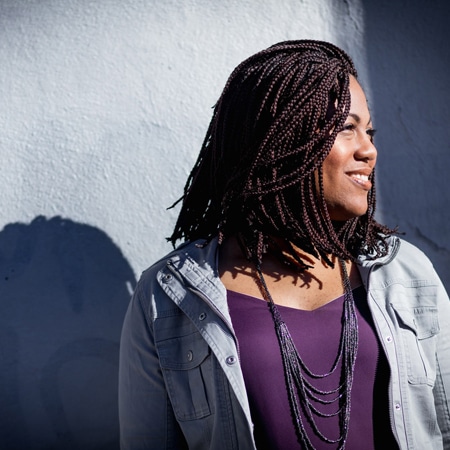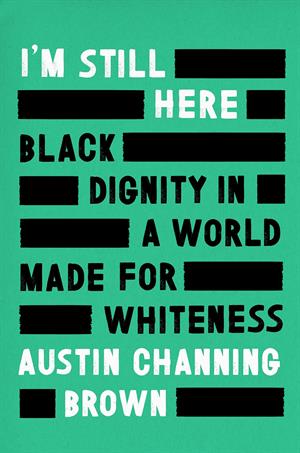Austin Channing Brown on Addressing Racism
Last week author, speaker, and producer Austin Channing Brown discussed her best-selling book, I’m Still Here: Black Dignity in a World Made for Whiteness, and her thoughts on race relations as the keynote speaker for ACUI Region VIII’s virtual conference.
Traveling around the United States while speaking at churches, on college campuses, and at festivals, Brown addresses the current realities of systemic racism in an incisive, fun, disarming, and transformative way by offering everyday actions directed at dismantling the foundations of white supremacy. She has a bachelor of arts in business management from North Park University, a master of arts in social justice from Marygrove College, and she began her professional career in the non-profit sector addressing issues of homelessness and housing, youth engagement, fund development, and church operations.
In addition to authoring a best-selling book, Brown is executive producer of The Next Question: A Web Series Imagining How Expansive Racial Justice Can Be, writes an antiracism newsletter called Roll Call, and shares her thoughts about living a meaningful life through The Goodlife Project podcasts.
The Bulletin asked Brown to talk about her book, ways of addressing white privilege, and how faith has played a role in her messages. This is what she had to say:
The Bulletin:
Your book moves from your early childhood to your experiences in the workplace in examining the inherent structures supporting whiteness. How do you think you were able to challenge thinking on race and color in a way that is really unique?

I don’t think I can make any claims to my book being unique, but I hope readers find that a memoir on race is helpful for seeing how both individual and structural racism breathe. You won’t find any definitions in my book, and there aren’t any checklists for overcoming racism. My deep desire is to affirm the experiences of people of color in America and offer clarity for those who are committed to the pursuit of racial justice but have trouble seeing it in their daily lives.
The Bulletin:
Upon reading your book, what are some of the reflections members of different identity groups—Black women or men, white women with Black children, white women or men—have shared with you?
It makes me so proud when people of any race say that my book has been helpful. People of color often say that they feel like I followed them with a camera and then wrote it all down! I know that my experiences as a Black woman have some differences from someone who is Latina or Indigenous or someone from a different marginalized community, but hearing people reflect that the book was helpful, affirming, made them feel less alone, is the best! White people usually tell me that wanted to throw my book across the room! And I don’t mind that either, because it means the book has moved them, even if it’s sometimes an uncomfortable reading experience.
The Bulletin:
What kind of work do white people need to do to experience an inversion of power to help understand the institutionalized unfairness, and also the inherent dignity, in the lives of people of color?
There are so many things white people can do. The resources for understanding America’s history and present are everywhere. Essays and articles, journals and books, movies and classes. There are folks to follow on social media, online workshops, workbooks, and free lectures. Often people of color are willing to recount their personal experiences by hosting events, attending community forums or writing on a host of different platforms. If white people want to learn more about this topic and what can be done, they need only to start looking.
The Bulletin:
You recommend that before people of color engage a white person on the topic of race that they first ask them to explore a resource—a book, an interview, a lecture or presentation—so the conversation can begin with that resource as the topic, rather than personal feelings. In addition to your book, what other resources would you recommend toward informing on those conversations?

I think the resource should be based on mutual interest. There are so many topics to explore when it comes to racial justice: education, health, environmental racism, etc. Or you could focus on certain writers, genres of music or movies, Black history… the possibilities are endless. The reason for my suggestion isn’t so that I can promote an Austin-approved list (wink). I just think it’s important for your conversation partner to invest in the conversation. And it can be helpful for both to have a sort of container for the discussion—a place to start, a focus.
The Bulletin:
Recognizing that racist beliefs and structures are pervasive in all aspects of our lives, do you see a way professionals on campuses can open windows for the privileged to understand the histories, perspectives, and disenfranchisement of BIPOC communities?
Sure! The most effective way may be to weave the work on antiracism into your curriculum, studies, and committee work. There are a number of ways that folks on campus can and do find ways to stretch their students.
The Bulletin:
How does being a person of faith fall into context with espousing revolutionary change, maintaining a commitment to racial justice, and challenging the narrative of a dominant culture?
Christianity is the lens through which I do this work. It inspires me and grounds me. It teaches me and informs how I approach my work. Growing up in the Black church was a gift for understanding the connections between theology, scripture, and justice. For me, they are entirely intertwined. But my personal choice in religion is certainly not a requirement or qualification for participating in racial justice. Every person must find their own ethic for the pursuit of the revolutionary.

